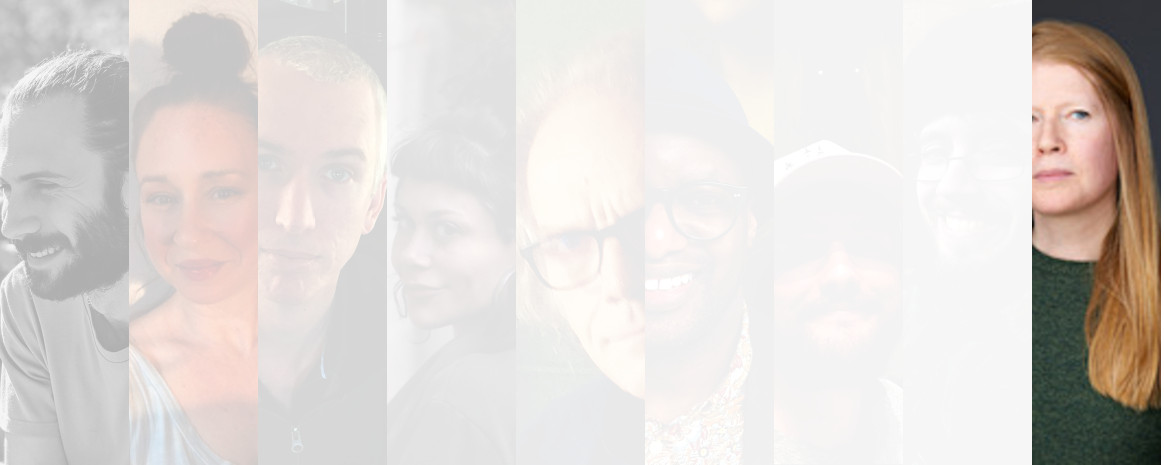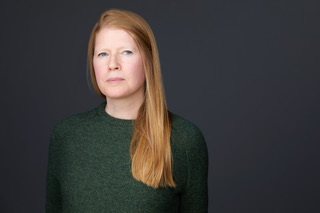
Lisa Martin reads “A Song, or Call”
A Song, or Call
I text my friend to check in. We’re basically just waiting for the last breath, he texts back, from somewhere in our city. I try to imagine the window frame, traffic, adjacent shopping, rain. I get on my bike, connect the helmet’s clips beneath my chin. I’m thinking of last breaths, riding at top speed to the bottom of the ravine. This was last night. So it is gone now: Everything. Me. You beside your dad. Your hands, his. Your shirt creased at the back above your belt. You have been wearing this shirt all day, leaning on things; there is a dip at the bottom of the ravine where cool air gathers. Breaths gather. I begin to shift gears; I have trained myself to love certain forms of pain, to think if I do this work I might be alive longer. I might be stronger. At the top of the ravine, I order a pint. Later, a piece of cake. It comes sprinkled with marigold petals, like a grave. Rain and wind. Overhead, strings of lightbulbs in pretty arcs. I am speaking now in the past tense. I have shifted tenses, gears. What do you do? What work? What would you have rather done? At the grad student meeting, we take turns saying our names and the names of our disciplines. I say my name, too, as if someone has not just died. As if someone did not die when I was so young his death ruptured the sky, made the cool air in the dip at the bottom of every valley colder. Sometimes I want to be sad forever. Do you? I don’t want sadness to kill me. Do you? I can be sad for the least reason, but I am now often also happy. When it is my turn to speak, I do not say my interest or my dissertation is the dead. And living: how to live. Have you ever biked so fast downhill into hard wind you felt you were the flung ash of your own life? Not dead, but capable of becoming dead very easily which is to say did you ever feel so much alive? I used to haul myself up from the river pushing the pedals as if reeling in a fish stronger than I was, by far, or winding up, with a winch, an anchor which had to come up if I were to live. Were any of us to live? For how long? I was having coffee. My friend had turned 61. Happy birthday, I said, at the precise moment, perhaps, you sent your text: Dad passed. I didn’t see your message for an hour. I was still thinking about that hour when, this afternoon, a grad student who studies the brains of black-capped chickadees told me her research intention is to determine how birds respond to one another’s calls, and songs. She has to make the birds dead to know. She puts the dead birds in an fMRI. But, first, she plays a recording of another chickadee’s call. She gives their brains an hour to be changed by what they’ve heard. I love you. I have a friend who grew up in poverty and violence. She is afraid of heights. Yesterday she scrambled a treacherous ridge with her companion, told me after: My spirit was alarmed. I said, Yes. Yes. I know. Which cells respond when another bird calls? When a bird sings alone will its own body answer? Is the spirit alarmed? Are the cells changed? What do the birds think they have heard? There was a time I did not have enough good friends. My spirit was alarmed. Now my poems are full of them. My life is full of them. I still want more. The friend whose birthday is today tells me she is teaching her students cliché. Not whether to use it or not but how it asks us to reconsider everything, what we make out of what is at hand. A young barista with an asymmetrical haircut takes our order. We do not know what other people need, how they will respond when we call, or sing. All my friends are too depressed for me to get them out of the house, my friend says. The barista delivers her coffee, my tea; he says, here, my friends. We’re basically just waiting for the last breath. Is it still good to be on this planet? my friend asks. It is a question, though she does not put it that way. She forms the words of a declarative sentence: It is still good. The things that change us are small—a song, or call. Last week the barista let my friend’s grandchild move the steam arm of the espresso machine. And, she says, for this I will always love him.

Lise Rochefort on “A Song, or Call”
Like the sun-flash of spokes off a bicycle’s turning wheel, this poem strobes with the pre-occupations of the quotidian and the universal. A text, small talk, birdsong, a barista’s kind gesture, cool breeze on hot skin; the expressions of life and death corkscrewing in and out of our daily routines as someone takes their final breath. Martin’s deft language and tense changes make a kaleidoscope of time. Definitely worth several reads.
Bios

Lisa Martin
Lisa Martin is an award-winning poet and essayist, the author of Believing is not the Same as Being Saved (University of Alberta Press, 2017) and One crow sorrow (Brindle & Glass, 2008). She is currently at work on a new book of essays. [updated in 2023]

